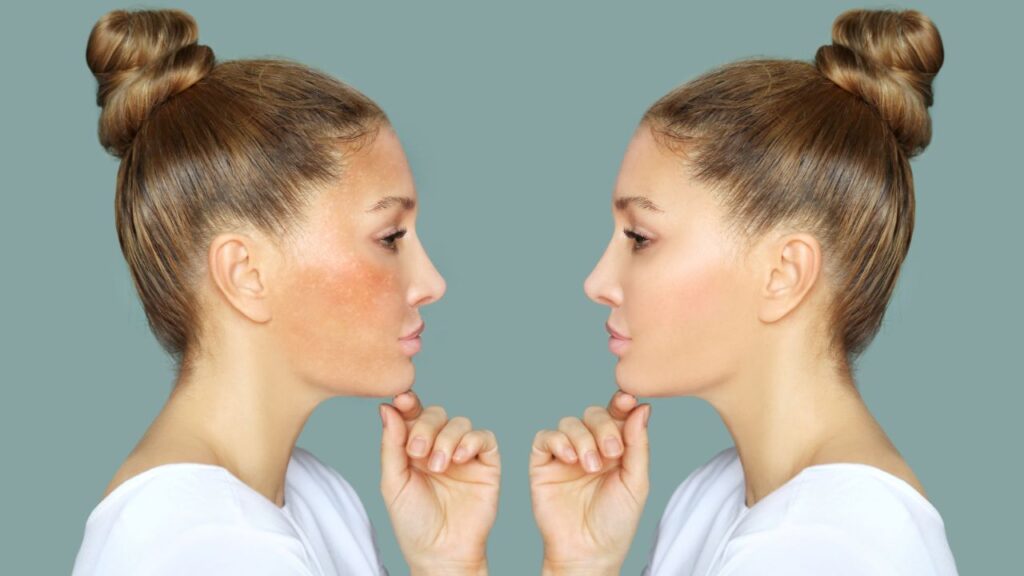Areola Lightening: Illuminate Your Confidence. Spoiled Laser, your go-to destination for beauty transformation, provides a range of premium services designed to help you achieve your desired appearance and boost your self-esteem. With offerings such as laser hair removal, skin bleaching, facial treatments, body contouring, and more, Spoiled Laser is committed to ensuring that you look and feel your best. One of their standout services is Areola Lightening, a procedure that aims to enhance the appearance of the areola, resulting in increased confidence and self-assurance. Discover how this revolutionary treatment can help you achieve your desired aesthetic and radiate confidence from within.
Understanding Areola Lightening
Definition and purpose
Areola lightening is a cosmetic procedure that aims to lighten the color of the areola, the pigmented area surrounding the nipple. The purpose of areola lightening is to address individuals’ aesthetic concerns and improve their self-confidence by achieving a desired color or shade for the areola.
Cultural and societal influences
Cultural and societal influences play a significant role in the popularity of areola lightening. Different cultures have varying beauty standards and perceptions of attractiveness, leading some individuals to feel self-conscious about the color or shade of their areolas. Media, including social media platforms, often portray a narrow definition of beauty, which can influence an individual’s desire to alter their appearance.
Factors to consider before undergoing the procedure
Before undergoing areola lightening, it is crucial to consider several factors. Firstly, individuals should have realistic expectations about the outcome of the procedure. Consulting with a professional can help determine whether the desired result is achievable. Additionally, individuals should be aware of the potential risks and side effects associated with areola lightening, as well as the necessary aftercare and long-term maintenance required.
Get Your Free Consultation Today
Preparation for Areola Lightening
Consultation with a professional
A consultation with a professional is an essential step in preparing for areola lightening. During this consultation, the individual can discuss their desired outcome and ask any questions they may have. The professional will assess their skin condition, determine the feasibility of the procedure, and provide an estimated timeline for achieving the desired results.
Medical history assessment
A comprehensive assessment of the individual’s medical history is critical before undergoing areola lightening. This assessment helps identify any underlying medical conditions, allergies, or medications that may affect the procedure or increase the risk of complications. It is vital to provide accurate and complete information to ensure the safety and success of the procedure.
Potential risks and side effects
Like any cosmetic procedure, areola lightening carries potential risks and side effects. These may include temporary skin irritation, redness, or swelling. In rare cases, individuals may experience allergic reactions or skin infections. Understanding these potential risks and side effects is crucial in making an informed decision and preparing for the procedure accordingly.
Procedure and Techniques
Topical creams and serums
One technique for areola lightening involves the use of topical creams and serums. These products typically contain ingredients such as hydroquinone, kojic acid, or alpha arbutin. The creams and serums are applied directly to the areola area and work to inhibit the production of melanin, the pigment responsible for the color of the skin. This technique often requires regular and consistent application over several weeks or months to see noticeable results.
Laser treatments
Laser treatments for areola lightening use specialized lasers that target the melanin pigment in the areola area. The laser energy is absorbed by the melanin, causing it to break down and ultimately fade. Multiple sessions may be required to achieve the desired level of lightening, depending on the individual’s skin type and the severity of pigmentation.
Chemical peels
Chemical peels involve the application of a chemical solution to the areola area, which causes controlled exfoliation and peeling of the outer layers of skin. This process stimulates cell turnover and promotes the growth of new, lighter skin cells. The depth and strength of the chemical peel can be customized based on the individual’s needs and desired outcome.
Microdermabrasion
Microdermabrasion is a non-invasive procedure that uses tiny crystals or a diamond-tipped wand to exfoliate the upper layers of the skin. This technique helps remove dead skin cells and stimulate collagen production, resulting in a lighter and more even-toned areola. Multiple sessions may be necessary to achieve optimal results.
Cryotherapy
Cryotherapy involves the controlled application of extreme cold temperatures to the areola area. This technique aims to freeze and destroy the melanin pigment, allowing new, lighter skin cells to regenerate. Cryotherapy may be used in conjunction with other techniques to enhance the effectiveness of areola lightening.
Aftercare and Recovery
Post-procedure instructions
After undergoing areola lightening, it is crucial to follow the post-procedure instructions provided by the professional. These instructions may include avoiding direct sunlight, wearing sunscreen, and maintaining proper hygiene. Following these instructions diligently can help promote optimal healing and minimize the risk of complications.
Managing discomfort and swelling
Some individuals may experience mild discomfort and swelling after areola lightening procedures. Applying cold compresses or taking over-the-counter pain medication as recommended by the professional can help alleviate these symptoms. It is important to avoid scratching or rubbing the treated area to prevent further irritation or complications.
Expected healing timeline
The healing timeline for areola lightening can vary depending on the chosen technique and the individual’s unique healing ability. Generally, individuals can expect the treated area to heal within a few days to a few weeks. Complete and long-term lightening results may take several weeks or months to fully manifest.
Long-term maintenance
To maintain the results of areola lightening in the long term, individuals may need to take certain precautions and incorporate specific skincare practices into their routine. This may include consistently applying sunscreen to protect the areola area from sun damage and avoiding prolonged sun exposure. Regular moisturizing and exfoliation can also help maintain the lightened appearance.
Areola Lightening vs. Areola Tattooing
Differences in the procedures
Areola lightening and areola tattooing are two distinct procedures that serve different purposes. Areola lightening aims to alter the natural color or shade of the areola, whereas areola tattooing involves the application of pigment to create the appearance of a natural areola or enhance the existing one. Lightening focuses on reducing pigmentation, while tattooing focuses on adding pigment.
Pros and cons of each method
The decision between areola lightening and areola tattooing depends on individual preferences and goals. Areola lightening offers the advantage of natural results and the ability to choose the desired color or shade. However, it may require multiple sessions and ongoing maintenance. Areola tattooing, on the other hand, provides a permanent solution and can help recreate a realistic areola appearance. However, the color may fade over time, and adjustments may be needed.
Choosing the right option for your needs
Choosing between areola lightening and areola tattooing is a personal decision that should be based on individual needs, preferences, and goals. Consulting with a professional and discussing the desired outcome can help determine the most suitable option. Factors such as desired permanence, desired color or shade, and willingness to undergo ongoing maintenance should be considered when making this decision.
Choosing a Professional for Areola Lightening
Qualifications and certifications
When choosing a professional for areola lightening, it is essential to ensure they have the necessary qualifications and certifications. Look for professionals who are licensed, experienced, and have undergone specialized training in cosmetic procedures. This ensures that they have the knowledge and skills required to perform areola lightening safely and effectively.
Experience and track record
An experienced professional with a proven track record is crucial when it comes to areola lightening. Research their background, including the number of years they have been practicing, their previous results, and any testimonials or reviews from previous clients. This provides valuable insight into their expertise and ability to deliver satisfactory outcomes.
Client testimonials and reviews
Client testimonials and reviews offer an opportunity to gauge the satisfaction and experiences of previous clients. Look for professionals who have positive feedback and a high number of satisfied customers. Reading these testimonials can help you gain confidence in the professional’s abilities and trust in their services.
Availability and affordability
Consider the availability and affordability of the professional before making a final decision. Determine their location, office hours, and whether they are easily accessible to you. Additionally, inquire about the cost of the procedure and any associated fees to ensure that it aligns with your budget.
Addressing Safety Concerns
Ensuring a sterile and hygienic environment
Safety is of utmost importance when undergoing any cosmetic procedure. Ensure that the professional follows strict protocols to maintain a sterile and hygienic environment. The use of disposable medical equipment, proper sanitization of the treatment area, and adherence to infection control measures should be observed to minimize the risk of complications and infections.
Proper disposal of medical waste
Disposal of medical waste should be handled according to established guidelines and regulations. This includes the proper disposal of used needles, gloves, and other single-use items. A responsible professional will have appropriate waste management practices in place to protect the environment and reduce the risk of cross-contamination.
Allergen testing for products used
Before undergoing areola lightening, inquire about allergen testing for the products and solutions used during the procedure. Sensitivities or allergies to certain ingredients can have adverse effects on the skin and overall health. A reputable professional will conduct patch tests to identify any potential allergic reactions before proceeding with the full procedure.
Monitoring for any adverse reactions
During and after the procedure, the professional should closely monitor the individual for any adverse reactions or complications. This may include checking for signs of infection, allergic reactions, or excessive redness or swelling. Immediate medical attention should be sought if any concerning symptoms arise.
Managing Emotional Impact
Understanding the reasons behind the choice
It is important to understand that individuals may choose areola lightening for various personal reasons. Some may have feelings of self-consciousness or dissatisfaction with the color or shade of their areolas. Empathy and understanding can help create a supportive and non-judgmental environment for those seeking this cosmetic procedure.
Coping with potential judgment or criticism
Individuals considering areola lightening may face judgment or criticism from others who do not understand their motivations or personal choices. It is essential to develop coping strategies to handle such reactions. Surrounding oneself with supportive and understanding individuals, seeking professional counseling if needed, and focusing on self-acceptance can help navigate these challenges.
Support systems and counseling options
Building a strong support system is crucial when considering areola lightening. Friends, family, or support groups can provide encouragement, understanding, and a safe space to discuss feelings and concerns. Additionally, professional counseling can provide valuable guidance and support throughout the decision-making process and beyond.
Safety Considerations for Pregnant and Breastfeeding Women
Impact on the baby and breastfeeding
Pregnant and breastfeeding women should exercise caution when considering areola lightening procedures. The impact of the procedure on the baby and breastfeeding must be carefully evaluated. Some techniques and products used in areola lightening may not be safe during pregnancy or while breastfeeding. Consulting with a healthcare professional is recommended to ensure the safety of both the mother and the child.
Recommendations for timing the procedure
If areola lightening is desired by a pregnant or breastfeeding woman, it is advisable to wait until after the breastfeeding period is complete. This allows the body ample time to recover and reduces any potential risks or adverse effects on the baby. Following the recommendations of a healthcare professional is crucial to ensure the well-being of both mother and child.
Empowering Body Positivity and Self-Acceptance
Challenging societal beauty standards
Areola lightening should be understood within the context of challenging societal beauty standards. Society often imposes narrow definitions of beauty, which can lead to body dissatisfaction and low self-esteem. Recognizing and challenging these standards is essential in promoting body positivity and self-acceptance.
Recognizing the uniqueness of every individual
Each individual has a unique appearance and should be celebrated for their individuality. Areola lightening should be seen as a personal choice rather than a requirement to conform to societal norms. Embracing and celebrating the diversity of bodies is an important step towards fostering a more inclusive and accepting society.
Celebrating personal choices and autonomy
Ultimately, areola lightening should be about celebrating personal choices and autonomy. Individuals have the right to make decisions about their own bodies and appearance. By respecting and supporting these choices, we can foster a culture of empowerment and self-confidence.
In conclusion, areola lightening is a cosmetic procedure that aims to address individuals’ aesthetic concerns and enhance their self-confidence. Before undergoing the procedure, it is important to consider factors such as realistic expectations, potential risks, and the necessary aftercare and maintenance. Different techniques, such as topical creams, laser treatments, chemical peels, microdermabrasion, and cryotherapy, can be used for areola lightening. It is essential to choose a qualified and experienced professional who prioritizes safety and follows strict hygiene practices. Emotional impact, safety considerations for pregnant and breastfeeding women, and empowering body positivity and self-acceptance are crucial aspects to consider. By understanding the complexities surrounding areola lightening and respecting individuals’ choices, we can contribute to a more inclusive and accepting society.



